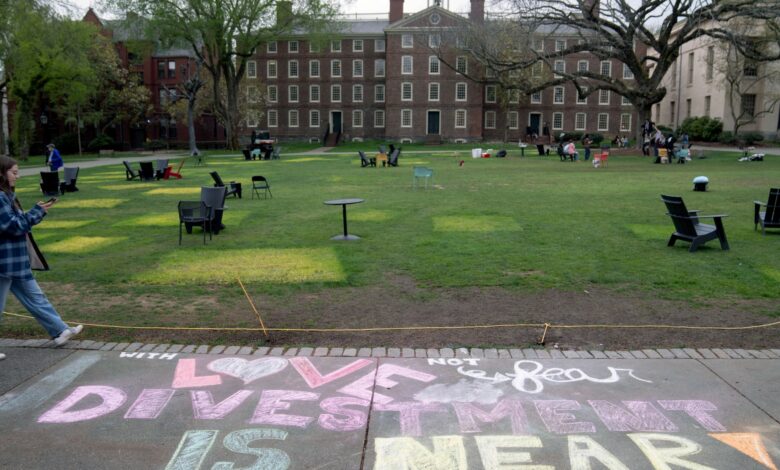Pro-Palestine protests: How some universities reached deals with students

EXPLAINER
Many campus protesters have taken down Gaza solidarity encampments after colleges agreed to consider divestment from Israel.
College campuses around the world have exploded in recent weeks in protests by pro-Palestinian students and faculty members against Israel’s war on Gaza, in which more than 34,000 people have been killed.
In university after university, protesters are demanding that their schools sever any direct or indirect financial and academic links with Israel, including by divesting from companies with ties to Israel.
The protests have led to an array of different responses from universities. On Monday, Columbia University cancelled its main graduation or commencement ceremony. Many universities have called police and other law enforcement agencies on to campus. In the United States alone, more than 2,000 students have been arrested. Both protests and the campus crackdowns have also spread to other parts of the world – from Canada to Australia, and in multiple European nations. On Monday, students at Oxford and Cambridge in the United Kingdom also set up encampments.
Yet, even as tension continues to soar at several campuses, students and administrators in some universities have managed to negotiate agreements that have acceded to some of the demands of the protesters.
So how have these universities managed protests – and what deals have students and administrators struck in these cases?
What are the compromises universities and protesters have struck?
For the most part, the agreements that have helped calm tensions have revolved around a few common themes:
- Some universities have agreed to divest from companies with links to Israel, while others have said that they will consider the demands and take them up with bodies in charge of overseeing their investments. In some cases, universities have agreed to demands to disclose their investments, without committing to divest.
- Other universities, including some that have also conceded ground on divestment-related demands, have agreed to invest in setting up new centres or hiring new faculty in a bid to create greater awareness about Palestine.
- In exchange, students on these campuses have agreed to end their encampments.
- In some cases, universities have chosen to take no action to disperse encampments, allowing them to continue. These include Wesleyan University in Connecticut and the University of California, Berkeley.
Which universities have agreed to specific student demands?
- Northwestern University, based in Illinois, US struck a deal with its protesting students on April 29 to take down most of the tents. It allowed them, however, to continue their protest – just not through an encampment – until June 1. The university promised to provide students with ways to engage with the Investment Committee of the Board of Trustees, including re-establishing an advisory committee on investment responsibility in the fall (autumn). The advisory committee could consider divestment proposals from university members. The institute agreed to disclose its investments through its endowment funds to “internal stakeholders”, which include current students, faculty, staff and trustees. Northwestern also agreed to cover education at the university for five Palestinian undergraduate students.
- Brown University in Rhode Island agreed on April 30 that the Corporation, Brown’s highest governing body, would vote on divestment from companies affiliated with Israel during a meeting in October. In return, students cleared the encampments that had been in place since April 24.
- Also on April 30, students and administrators at Evergreen State College in Washington agreed to a pact. Students removed a week-long encampment. The university set up task forces to assess – among other things – investment policies and the possibility of divestment, and look at whether the school’s policies regarding grants help governments engaged in illegal occupations abroad.
- On May 1, the University of Minnesota announced a compromise under which it promised to provide protesters with information on public companies it has invested in. However, the university made it clear that non-disclosure agreements barred it from disclosing information about private companies that the school has invested in. It added that the administration had recommended to the University’s police department that it avoid arresting student protesters. However, the university said it will not ban employers from career fairs because it does not “support restricting student career opportunities”. Students had been demanding that firms with ties to Israel not be invited.
- Student protesters from Rutgers University in New Jersey reached an agreement with the administration on May 2. The university agreed to create an Arab cultural centre and hire staff and instructors who have knowledge about Palestinian communities alongside naming Palestine, Palestinians and Gaza in future communications. It also agreed to work with students, faculty and staff to support 10 displaced Palestinian students to complete their education at Rutgers. No students, staff or faculty involved in the encampment will face retaliation, the university promised. The students’ request for divestment is also under review.
- Goldsmiths University in the UK reached an agreement on May 3 after students set up encampments in the university’s library. Goldsmiths agreed to a new ethical investment policy. The protesting student group will have an opportunity to present their “evidence of Goldsmiths’ complicity with Israel” to the institute’s finance committee. Goldsmiths also agreed to name one of the media department’s lecture theatres after Shireen Abu Akleh, an Al Jazeera reporter who was killed by Israeli forces while she was on assignment in the West Bank. The institute will also conduct a review of the International Holocaust Remembrance Alliance (IHRA) definition of anti-Semitism which critics have described as so broad as to effectively bar most criticism of Israel.
- The University of California, Riverside (UCR) issued a statement on May 3 saying an agreement has been reached to peacefully end the encampments. The university announced it would publish several details of its investments online. UCR’s School of Business has also discontinued multiple global programmes, including those in Israel. Students also want the university to ban the sale of Sabra Hummus, a packaged hummus brand owned by PepsiCo and the Israel-based Strauss Group, from campus. The university said it would review the demand.
- Thompson Rivers University (TRU) in Canada’s British Columbia also saw an agreement on Saturday, May 4, following negotiations, making it the first Canadian institute to see a deal. TRU’s student group called the People’s University of Gaza at TRU did not have encampments and began their push towards divestment through an email sent to the administration on April 30, a TRU student protester wrote in a statement to Al Jazeera. The TRU administration has agreed to disclose their investments within 30 days of the students filing a Freedom of Information (FOI) request. A student at TRU told Al Jazeera that they have already filed the request. Once TRU discloses its investments, students will draft a divestment proposal. However, TRU has refused to publicly condemn and demand an end to “acts of genocide in Gaza,” which was one of the students’ demands. “We will continue to engage with the institution on this matter,” a press release by the People’s University of Gaza at TRU said.
What’s happening on other campuses?
Columbia announced on Monday that there will be smaller, school-level ceremonies during this week and the next, instead of a large commencement.
Also on Monday, pro-Palestine student protesters at the Massachusetts Institute of Technology (MIT) resisted a university deadline to clear the encampment. This was after the institute’s president issued a warning letter to students where he asserted they would be suspended if they did not disperse voluntarily. Harvard authorities issued a similar letter to students on Monday, saying that the students who continue with the encampment “will be referred for involuntary leave from their Schools”.
Students at more than 100 universities are protesting across the US. Their counterparts in at least 20 campuses outside of the US are protesting and several of these protests are also encampments.
What are the reactions to the encampment deals?
While some students and those supporting them have welcomed the breakthroughs with university officials, others have criticised the deals as inadequate. Northwestern University is a case in point.
Immediately after the deal, two Palestinian students at the university said they were proud to “have a seat at a table that we’ve never had before,” student-run newspaper The Daily Northwestern reported. Similarly, the student protesters at Brown celebrated the deal after the encampment was dismantled.
Here is another idea #ColumbiaUniversity, instead of turning your campus into a police state https://t.co/AIBV4N0dZ5
— Matteo Farinella (@matteofarinella) May 1, 2024
However, not everyone has hailed the deals as a win.
this is NOT good. The divestment is NON BINDING and the vote won’t happen until OCTOBER. Administration win for this https://t.co/ty2OGN2WwM
— lucas 📕 (@lucas_s21122) May 1, 2024
The Daily Northwestern reported that some students were disappointed that the deal did not involve divestment.
On the other hand, critics of the pro-Palestine protests have also accused the universities of buckling under pressure in reaching the agreements.
Not only is it a major cave, it’s also got major anti-Semitic implications
Dude weird it’s like the “until our demands are met” Rutgers protester-agitator branch planned it that way https://t.co/7n3HuNXNbu
— AAPL Tree (@AAPLTree) May 3, 2024
On May 1, two graduate students and one first-year undergraduate student at Northwestern University sued the institute in a breach of contract lawsuit, saying that the university breached its own rules by allowing the encampments. The lawsuit also criticised the agreement for allowing student protesters to stay on campus until June 1.



